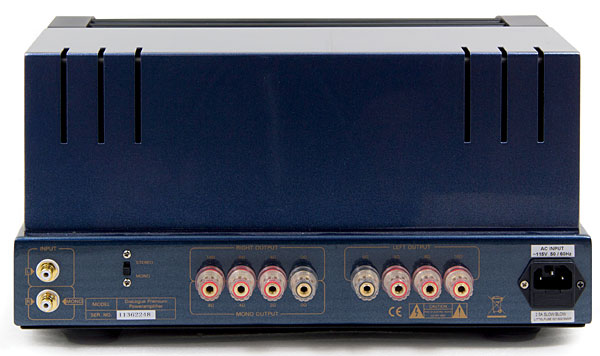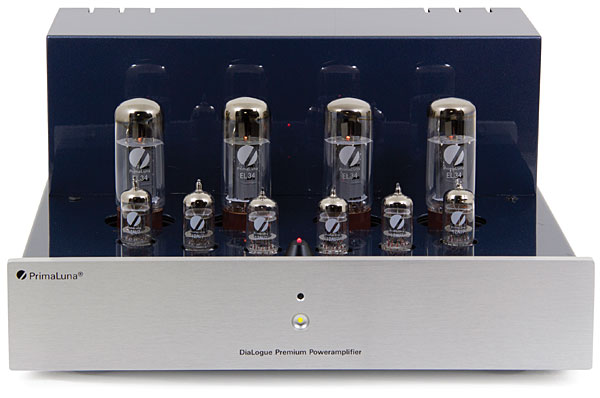| Columns Retired Columns & Blogs |
Correct me if I am wrong; but shouldn't this be called PrimaChina?
One final (I promise) note: Although a specification isn't given, the PrimaLuna DiaLogue Premium appeared, in my system, to offer gain so much higher than the norm that I was forced to use my Shindo Laboratory Masseto preamplifier, itself no gain slouch, with its volume control set near the bottom of its range—and the bottom of the range of most stereo potentiometers is not known for good channel-to-channel tracking. During my listening, I did note that the left channel seemed slightly louder than the right, but I attributed that to the preamp's volume pot; in the event the amp was also at fault, that will show up in John Atkinson's measurements.

Listening
After a longer-than-average running-in —itself occasioned by the rediscovery, behind the television set, of the remote handset for my Sony SACD/CD player, thus enabling me to once again use the SCD-777's Repeat function—I began my more intensive listening with simple music: the wonderful-sounding, monophonic A Collection of Favorites by the Carter Family (LP, Stetson HAT 3022); the eponymous, brilliant, groundbreaking, and artistically audacious if sonically brittle debut album of Loudon Wainwright III (LP, Atlantic SD 8260); the grainy but otherwise okay-sounding Teaser and the Firecat, by Cat Stevens (LP, Island ILPS9154); and various selections from the Nick Drake catalog, on Island and Hannibal. All sounded fine through the PrimaLuna DiaLogue Premium, with appropriate scale and believable vocal and instrumental timbres.
But the Carter Family album was served best of all. Here, the DiaLogue Premium impressed me by nailing the distinctive and historically influential sound of guitarist Maybelle Carter's pick attack, not to mention the charmingly unaffected (and at times downright flat) sound of her voice.
That said, the DiaLogue Premium was at its best with music of size, scale, drama, and complexity: It was, indeed, a bigger-is-better kind of amplifier. The PrimaLuna amazed and delighted me throughout the good if not quite top-shelf recording of Wagner's Das Rheingold, recorded in 1993 by Christoph von Dohnányi, the Cleveland Orchestra, and a cast whose greatest standout was Peter Schreier's Mime (2 CDs, Decca 443 690-2). Besides allowing the music to retain an appropriate sense of scale, and endowing everything from plucked strings to violently hammered anvils with a believable sense of force, the PrimaLuna amp allowed voices to sound unusually warm and present, while at the same time reproducing nuances of pitch and inflection with uncommonly good clarity.
A welcome letter from reader Milo Shepherdson reminded me how much I enjoy Ike Quebec's Soul Samba (Blue Note/Classic ST-84114)—and how I botched my reference to it in the November 2013 "Listening," imagining a piano where there is none. In fact, it was during this casual bit of listening that the excellence of the DiaLogue Premium really dawned on me. The amp gave my Shindo Corton-Charlemagne monoblocks a real run for their money on every track of this record, the PrimaLuna caressing each number with a very full and rich yet musically detailed and explicit presentation. Quebec's tenor-sax tone was perfect and big, yet the PrimaLuna thought the real star was guitarist Kenny Burrell, whose solos it presented with exceptional, world-class touch: I have never heard his playing, or indeed this album in its entirety, sound better.
The recording by the Ensemble de Solistes des Concerts Lamoureux of Darius Milhaud's Les Quatre Saisons, led by the composer (LP, Philips 6504 111), is perhaps one of the best-sounding LPs in my collection: open, clear, and dramatic, with good tonal balance, realistically weighty bass, and remarkable spatial depth; it is also a recording of sublimely melodic yet unmistakably modern—at times, somewhat angular—music. The PrimaLuna honored every one of those aspects. The entrance, in the first movement—Printemps, of course—of the double bass was reproduced with virtually peerless tension and impact, and believable note attacks and decays. Strings had realistic bite and not a sliver more, and the PrimaLuna amp endowed—or, if you wish, allowed—strings of notes to have a very believable, engaging sense of momentum and flow.
During the PrimaLuna's time in my system, I also made note of its performance on those many records that fall short of the sonic ideal. In every such case, the DiaLogue Premium let those recordings retain their characteristic signatures—dark sounded dark, bright sounded bright, and so forth—while reproducing them with all due melodic and rhythmic realism. One example was Joanna Newsom's sort-of-live album from 2007, Joanna Newsom and the Ys Street Band (EP, Drag City DC336), an unrepentantly shouty and overly forward recording that's also frustratingly murky: frustrating because these rearrangements—for musical saw, tambura, accordion, and drums, alongside Newsom's usual harp—of mostly familiar Newsom songs are quite engaging on those occasions when the musical details emerge above the sonic mud and glare.

As with the above-mentioned Carter Family collection, the PrimaLuna did a consistently fine job of capturing the solidity, substance, and impact of every great mono recording I played through it. The most notable example came one evening as I worked my way through the 1963 boxed set Wilhelm Furtwängler: In Memoriam (LP, Deutsche Grammophon KL.27/31). Although I have yet to experience all of Furtwängler's recordings, it seems he was seldom truly well served by sound engineers, making all the more conspicuous his few really great-sounding sessions—including his 1953 performance, with the Berlin Philharmonic and soloist Wolfgang Schneiderhan, of the Beethoven Violin Concerto. To hear it through the PrimaLuna was to hear a superb amplifier magnify and exploit the strengths of a transcendent music recording. Nor was the DiaLogue Premium immune to the tactile, substantial, richly colorful charms of my favorite 78s, including Suite 2 from Prokofiev's Romeo and Juliet, lustily played by the Moscow State Philharmonic Orchestra and conducted by the composer (shellac, Disc Company of America2 754); and the Prelude to Wagner's Parsifal, performed by Serge Koussevitsky and the Boston Symphony Orchestra (shellac, RCA DM 1198).
Perhaps best of all, the DiaLogue Premium played rock'n'roll without compressing, cleaning, or de-balling it, while also preserving the color and texture that virtually all music has and deserves to keep. During its time here, the DiaLogue Premium played records by the Replacements, the Flamin' Groovies, Big Star, Guided by Voices, and sundry others—all on vinyl. All sounded amazing, none more so than the New York Dolls' Too Much Too Soon (LP, Mercury SRM-1-1001), which is, in its way, one of the rawest post-'50s rock records I know: When it's guitar-solo time, lead player Johnny Thunders simply turns up his guitar—sometimes a little too much, sometimes not quite enough, with no effort to cheesily smooth these transitions. The Dolls play Sonny Boy Williamson's "Don't Start Me Talkin'" brilliantly and loudly—so loudly that the piano player has to pound to be heard (and scarcely manages that, just as in a live setting). And the drums and electric bass hit hard—very hard—in the most wonderful way. The PrimaLuna captured and preserved it all.
Conclusions
I tried to find fault with the PrimaLuna DiaLogue Premium. I failed. In particular, I tried to detect some mechanical or otherwise non-natural, non-organic quality to its sound, given the preponderance of switches and silicon inside its good-looking casework. I failed at that, too.
I've had the pleasure of reviewing some remarkable amplifiers in the past few years. In many respects, the DiaLogue Premium, though far from the most expensive, is among the four or five most enjoyable. It didn't have the crazy-good clarity and presence of the Lamm ML2.2 ($37,290/pair), or the color and richness of the Shindo Laboratory D'Yquem ($25,000), or the sheer temporal grip and momentum of the Ayre Acoustics AX-5 ($9995). But once I hit on the right configuration, as described above, the DiaLogue Premium consistently delighted me. And, if memory serves, it exceeded in that regard the more expensive DiaLogue Seven.
. . . and the choices! Given especially that the PrimaLuna's sheer switchability came with no apparent sonic penalties, I can't imagine the user who would not be pleased by its uncommon level of flexibility. With no combination of settings did the DiaLogue Premium make a shouty recording sound like a sweet one, or a digital recording sound like an analog one—but it did offer a few different perspectives on the same beautiful, realistic truth. A very strongly recommended amplifier, and at $3199, a hell of a good value.

Correct me if I am wrong; but shouldn't this be called PrimaChina?

I happen to own the Prologue Power and Dialogue Pre-amps, and thought this review was spot on and in-line with Primaluna values and built qualities. Will PrimaAmerica or PrimaEuro indicates quality, if made there with exorbitant pricing?